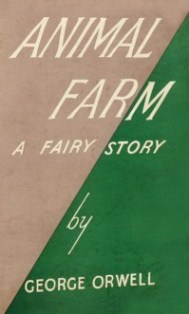
First published back in August of 1945, British author George Orwell’s (Eric Arthur Blair’s pseudonym) novel ‘Animal Farm’ has been hailed as a modern literary classic ever since its publication, and along with ‘Nineteen Eighty-Four’ (1949), is one of the authors most well-known and highly-revered offerings.
The tale has been adapted for both the big and small screen over the years.
DLS Synopsis:
On Manor Farm, the heavy-drinking owner, Mr Jones, has been neglecting the farm animals for quite some time. As a result of the farmer’s failings, the old prize-winning boar named ‘Old Major’ has called a meeting with all the farm animals. His announcement is dramatic. He has come to the conclusion that humans are nothing more than parasites, feeding off the animals that they incarcerate. Old Major’s speech pushes further, with encouragement of rebellion against their neglectful masters; an uprising that will see them taking over the farm.
“Everyone is equal” the animated old boar exclaims. His audience are completely captivated by his teachings. But tragedy sticks when three days later the wizened old boar dies. The farm is in mourning. But the two young pigs, Snowball and Napoleon want to see Old Major’s preaching’s turn into a reality. The two pigs assume control over the leadership of the animals and begin the first stages of their uprising against Mr Jones and his negligent rule.
With the rebellion now firmly underway, Snowball begins teaching the other animals so as to increase their overall intelligence, whilst storing away additional provisions. Meanwhile, Snowball’s counterpart, Napoleon, has begun training up the young puppy dogs on the farm, to assist him in his own personal role as a great leader of the farm animals. However, soon enough Mr Jones comes back with one thing on his mind – to reclaim the farm that was once his. It’s time for action. And the animals are victorious at the great ‘Battle of the Cowshed’.
But cracks are beginning to form in the leadership of the farm. Friction between Snowball and Napoleon is causing a power struggle to take place. Snowball’s ideas of erecting a windmill simply pour salt in the wound. So much so that Napoleon’s direct opposition to the windmill results in his chasing Snowball away from the farm with the aid of the nine ferocious dogs that he now has under his personal charge.
Napoleon immediately assumes sole responsibility for the leadership of the farm. He quickly enlists a committee of fellow pigs to oversee and take charge of the day-to-day running of the farm. There is now a new ruler of the farm. One who will see to it that the farm is prosperous. And the pigs will be at the very forefront of its success.
But such an oppressive rule will always have its costs. And it only takes the slightest snag in the fabric of its running for the dominating leadership to come crashing down. Animal Farm has many changes on the horizon. Not every one of them for the good of its community...
DLS Review:
Since its publication, Orwell’s ‘Animal Farm’ has been revered as an absolute modern-day literary classic, delivering an honest and down-to-earth political message transposed into an amusingly ‘Disney-like’ setting of an animal farm. The political satire that creates the absolute backbone of the tale delivers a strong ‘outsiders’ perspective on Stalin’s undeniably cruel regime. The story itself is that of the Russian Bolshevik revolution, with the glaring failures in the communist ideals exposed within the simplistic setting of a farm whereby the animals have begun a forceful revolution.
Power, greed, oppression and propaganda make up the predominant building blocks of the tale, with the slippery slope into totalitarianism explored and exposed for all its tyrannical ugliness. The refreshing ease of absolute honesty that Orwell is able to give in the novel is the true key to its absolute and undoubted success. With transposing the circumstances into an ‘animal farm’ setting, Orwell has been freed of all prickly political censorship, and has been able to tell a tale through this incredibly satirical medium, with a direct and unencumbered air.
The messages and warnings are as blatant as the animal farm allegory, with the implications and repercussions shown in a strong, bold and stripped-to-the-bone fashion. The story itself is told with the masterful nature of an expert storyteller – with the political base of the storyline delivered with the compelling ease of a well-written and completely engrossing read. Indeed, the tale reads as if it is considerably far-removed from the political complexities of Soviet Communism. But it’s there, in this easy-to-digest storyline. In fact, there’s no real need to have any real understanding of Soviet Communism, or more specifically the Russian Bolshevik revolution, to take enjoyment from the novel, or indeed to interpret and appreciate the strong messages that are brought out so clearly exposed onto the table.
The storyline races along at a galloping speed, cramming in the twists and turns of the escalating tyranny, with barely a second spared on anything that doesn’t have an integral involvement in the development of the ultimate goal. Nevertheless, Orwell still manages to maintain a thoroughly engrossing read, with plenty of colourful animal characters taking on their symbolic roles that they play out; each with their intricate and necessary parts in the grand scheme of the dictatorship’s downfall.
With the pre-destined structure of the tale already mapped out, Orwell carves out his message with a purposeful and uncompromisingly direct approach. Don’t get me wrong, the tale never gets too weighed down with the intricate details of the whole allegory, but instead sticks to a purposeful single-minded and unwavering route that brings in every aspect that is necessary to reach a clear final goal and thought-provoking conclusion.
It’s without doubt a truly spectacular read.
The novel runs for a total of 112 pages.

© DLS Reviews






